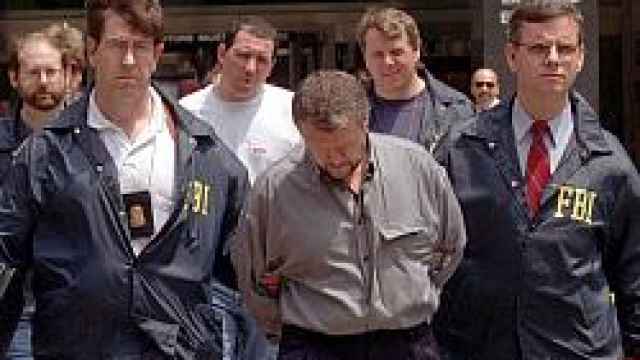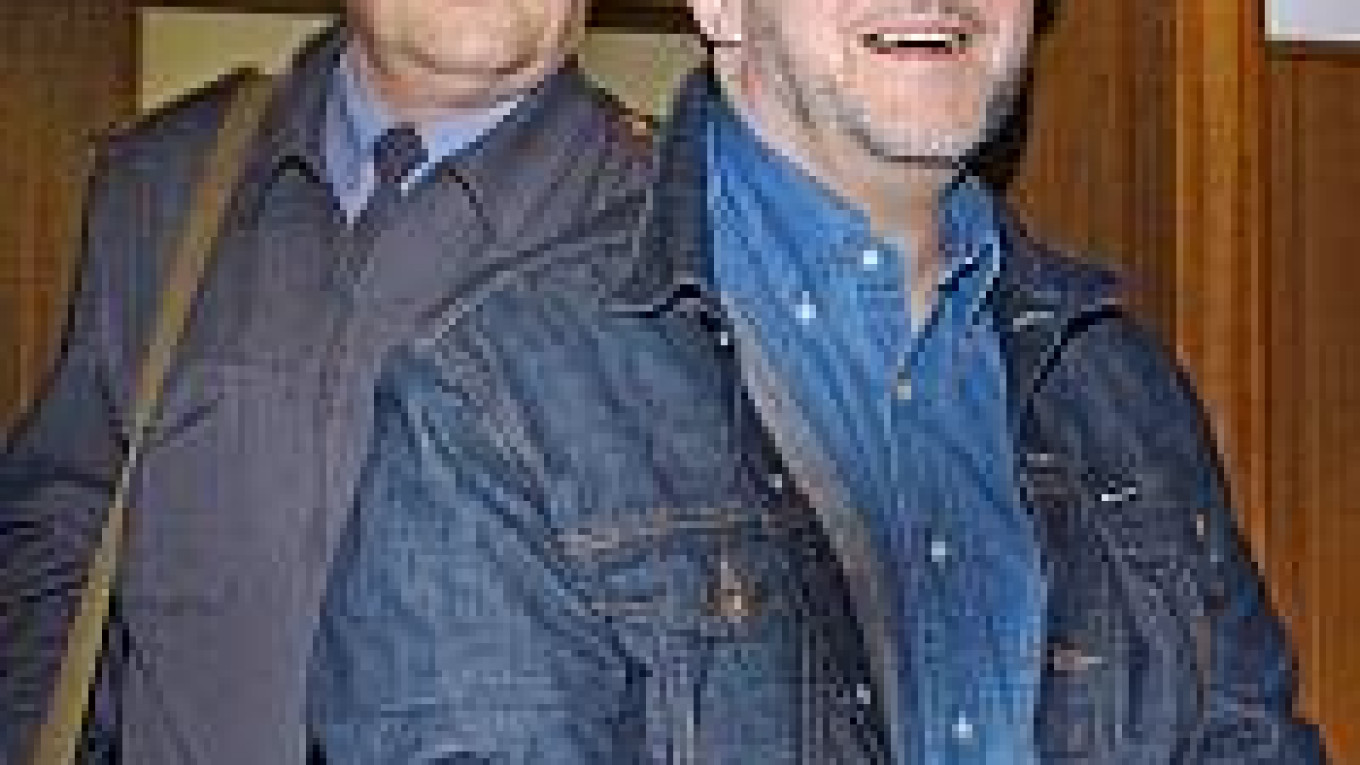The Moscow City Court jury took less than an hour to acquit Ivankov, known as Yaponchik, or the Little Japanese because of his vaguely Asian features, of charges that he shot dead two Turkish nationals and injured a third in a Moscow restaurant in 1992. Shortly after the killings, Ivankov resurfaced in the United States, where he later served a sentence on extortion charges.
The two victims, Hanan Gueltiken and Hussein Uygan, died at the Fedan restaurant following the shooting, while the third, Ahmed Taranchi, was severely wounded. The slayings apparently followed a quarrel at the restaurant's cloakroom, when the Turkish customers received their coats first.
"What happened today is what should have happened," Ivankov's lawyer, Yury Rakitin, said by telephone following the acquittal Monday evening. "He is absolutely not guilty, and all 12 jurors agreed that he was in no way involved."
After the verdict, Ivankov turned to the jury and said, "Thank you very much," Rakitin said.
City Prosecutor Maria Semenenko said the prosecutor's office would appeal. "We unanimously disagree with this decision," Semenenko said on NTV television.
Organized crime experts were divided on what influence Ivankov might have on the criminal world as a free man, and a veteran New York detective said Ivankov was never as dangerous as U.S. and Russian authorities had suggested.
Ivankov had insisted that he was not present in the restaurant that evening. Of the 13 witnesses who took the stand during the trial, which was held behind closed doors at the request of the prosecutors, only one identified Ivankov as the man who pulled the trigger, Rakitin said.
Rakitin earlier said that several Kyrgyz citizens who witnessed the killings testified that the gunman was tall and had red hair, a description that bears little resemblance to Ivankov.
"They [the court witnesses] said the same thing that they said 13 years ago," Rakitin said Friday, referring to the initial investigation into the killings. "They said they had never seen [Ivankov] before in their entire lives. The person they saw was 1.80 meters tall. My client is 1.63 meters tall with his hat on."
Ivankov was released from custody following the verdict and was shown on NTV on Monday evening hugging well-wishers waiting for him as he emerged from the courthouse.
It is unclear exactly when Ivankov landed on U.S. soil, although Russian authorities have said might have left the country in late 1992. He previously served 10 years on robbery charges and was released in 1991.
Now it has been more than 10 years since Ivankov was roused by FBI agents pounding on the door of his girlfriend's apartment in the Brighton Beach neighborhood of New York. Reportedly disheveled and dressed in his underwear and a black T-shirt, Ivankov was arrested in the early morning raid on June 8, 1995, and charged with trying to extort $3.5 million from the owners of Summit International, an investment firm that targeted Russian emigres.
The day after Ivankov's arrest, a senior FBI official in Washington speaking on condition of anonymity, told The Associated Press that "getting this guy is equivalent to arresting a Gambino," a reference to the late Carlo Gambino, the reputed leader of one the United States' most powerful mafia families.
Ivankov was found guilty of extortion and arranging a fraudulent marriage to keep him from being deported and sentenced to 9 3/4 years in prison in January 1997. As FBI agents escorted him out of the courtroom, he kicked and spat at reporters.
Ivankov, now 65, was deported to Russia on July 14 after serving out his sentence at the Allenwood federal prison in Allenwood, Pennsylvania. City prosecutors had charged him over the restaurant killings in absentia in 2000, but the investigation then stalled because he was out of their reach.
While Ivankov had a reputation as an authoritative criminal figure in the Soviet Union, many crime experts are skeptical that he was the nefarious crime kingpin whom U.S. authorities made him out to be.
Ivankov, who was born in 1940, gained notoriety in Moscow in the late 1960s and 1970s as a member of the Mongol gang, which specialized in blackmail and extortion and was led by one of the original vory v zakone, or thieves-in-law, Gennady Kharkov, who was also known as the Mongol, according to Alexander Maximov's 1997 book "Russian Crime: Who's Who."
Maximov wrote that Ivankov became a thief-in-law during his prison stints in the 1970s, joining an infamous fraternity of top criminals that maintains its own code of behavior, laws, courts, leaders and initiation rites, and that disdains any institution other than its own.
According to Maximov, Ivankov was convicted in 1981 after an extensive police investigation into his extortion schemes and sentenced to 14 years, but the sentence was cut short in 1991 amid speculation that he might have bribed the judges or have had longstanding ties with the Soviet secret services.
After his arrival in the United States, the FBI linked Ivankov to drug trafficking, arms smuggling and money laundering in the United States, and they accused him of coming to New York to establish control over a hodgepodge of Russian criminal gangs.
Skeptics, however, call those claims absurd, noting that U.S. authorities were able to pin charges only of a single count of extortion and marriage fraud on Ivankov.
Peter Grinenko, a 22-year Russian-speaking veteran of the New York Police Department and a specialist in Russian crime cases, said Ivankov used his reputation as a Russian mafia kingpin to pull off two-bit extortion rackets.
"If you try to extort someone as an independent criminal, you'll probably get a smack in the face, or you might get shot," Grinenko said by telephone. "But it's a different story if you go in as the head of the Russian mafia. It's all bullshit. It's all based on a myth."
 Monika Graff / AP Vyacheslav Ivankov, center, being escorted by FBI agents from the agency's New York headquarters on June 8, 1995. | |
"In Russia, Ivankov is just as popular as Alla Pugachyova and Michael Jackson," said Alexander Kalyanov, a shanson singer who showed up at the courthouse on July 4, the first day of the trial, to find it was closed to the public.
Another singer, Villi Tokarev, arrived the same day with autographed copies of a song he had written in Ivankov's honor. The song was titled "Slava," a word that means "glory" and is also a diminutive form of Ivankov's first name, Vyacheslav. The opening lyrics are: "Slava, hold out a bit longer/ We have 120 years to live/It's a shame that I can't buy you a ticket for the road to freedom."
Ivankov, presuming Monday's acquittal stands, presents little threat as a free man, said Mark Galeotti, director of the Organized Russian & Eurasian Crime Research Unit at Britain's Keele University.
After nine years in a U.S. prison, Ivankov's criminal contacts in Russia are probably "old, stale and dead. He would likely be seen in the criminal world as more of a nostalgic figure," he said.
"He has little to offer the new generation of criminals," Galeotti said. "If he does go back to committing crimes, he'll probably get caught, and the people who are looking after him will probably disavow him."
But Larisa Kislinskaya, a leading crime journalist with the tabloid Sovershenno Sekretno, said Ivankov would remain a relevant figure, if only because of his authority as a thief-in-law with the criminal leaders who preside over life behind bars.
"Prison life is still run by the thieves' law," Kislinskaya said. "They may not have to respect him while they are free, but if they ever land in prison, they had better respect him. As long as there is a prison system, Ivankov will be an authority."
A Message from The Moscow Times:
Dear readers,
We are facing unprecedented challenges. Russia's Prosecutor General's Office has designated The Moscow Times as an "undesirable" organization, criminalizing our work and putting our staff at risk of prosecution. This follows our earlier unjust labeling as a "foreign agent."
These actions are direct attempts to silence independent journalism in Russia. The authorities claim our work "discredits the decisions of the Russian leadership." We see things differently: we strive to provide accurate, unbiased reporting on Russia.
We, the journalists of The Moscow Times, refuse to be silenced. But to continue our work, we need your help.
Your support, no matter how small, makes a world of difference. If you can, please support us monthly starting from just $2. It's quick to set up, and every contribution makes a significant impact.
By supporting The Moscow Times, you're defending open, independent journalism in the face of repression. Thank you for standing with us.
Remind me later.


